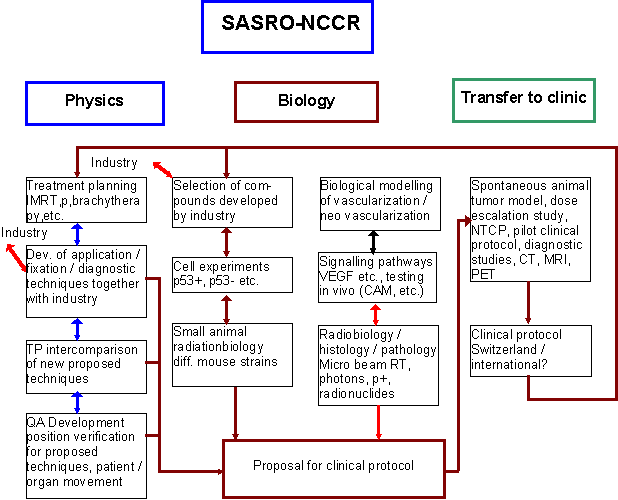| Bulletin 1/00 ----------
Varian-Preis
Lage und Zukunft
WG SCBI
Optimization and Individualization
Winterschule
in Pichl
Stellenmarkt
Tagungskalender
Vorstand SGSMP
(Adressen)
----------
andere Bulletins / d'autres bulletins / altri bolletini /
other bulletins
|
"Optimization and Individualization of Radiotherapy
"
a proposal for a National Centers of Competence in
Research (NCCR)
project by the
Scientific
Association of Swiss Radiation Oncology (SASRO)
Introduction
In the SGSMP Bulletin 1/99 you have been informed that the SASRO has
written a notice of intent for a NCCR proposal.
The idea to apply for an NCCR grant was the result of
discussions within the SASRO "basic and
translational research group" and with the SASRO
executive board. During 1999 meetings were held in
various groups of SASRO and SGSMP to come up with a
preproposal by end of July 1999. The SASRO network should
be the backbone of a collaboration to strengthen the
position of radiation oncology in Switzerland over the
next five to ten years. It was clearly realized that the
chances were modest. It was decided that it was
nevertheless worth to try it. In case we were not
successful in the first run a second chance would come up
approx. two or three years later and the ideas worked out
could also be the base for scientific proposals to the
Swiss National Science Foundation or to the Swiss Cancer
League. The hope was however to succeed with the NCCR and
to get substantial resources to support a network of
research thereby improving radiation oncology to the
benefit of the patients.
Main research
topics
The following should
remind you of the main ideas and of the reasoning:
Ionizing radiation is the most important single agent
for cancer treatment. Between one third and one
fourth of the Swiss population will suffer from cancer
during their life-time, and over 50% of these will be
treated by radiation oncologists i.e. about 15'000
patients each year in 20 registered radiation oncology
centers. Important steps have been made towards better
treatment modalities and safer applications, mainly as a
consequence of better target/tumor definition, high
precision of treatment delivery, different modalities of
therapy (photons, protons, electrons, brachytherapy) and
use of refined prognostic factors tailored to cancer
therapy according to the aggressive behavior of the
individual neoplasm. Furthermore, the rapid evolution in
the field of biology and computer technology relevant to
clinical radio-oncology (molecular biology and
radiophysics) is expected to lead to a significant
increase in cured cancer patients in the next decade, and
to a considerable improvement in quality of life for most
patients. The key part in this potential improvement will
be individualized treatment on the basis of a promotion
and coordination of research from basic principles to
controlled clinical studies as outlined in this proposal.
New developments in beam delivery, treatment planning,
and patient positioning are necessary prerequisites
for precision radiotherapy. The important contributions
of Swiss radio-oncology departments to 3-D-dose planning,
intensity modulated irradiation techniques, stereotactic
photon radiotherapy; and its leading position in the
development of dynamic proton beam delivery at PSI, with
the World's first compact gantry, are essential for
investigating state-of-the-art radiation treatments.
Switzerland is, therefore, ideally equipped for
optimizing and comparing combined radiation modalities on
a theoretical basis and in clinical trials.
Image fusion will be developed using CT, MRI, PET,
SPECT, and biological imaging, for a more precise and
specific treatment planning. Computer-aided positioning
systems are needed to increase precision, reduce setup
time, and monitor patient movement during treatment. Real
time tracking of tumors moving inside the patient’s
body with feedback to the irradiation delivery will be
developed. Verification of the dose distribution
(including quality control) for the individualized 3-D
dose treatment is a major goal of the proposal.
Radiobiology is a basic research discipline to
establish novel treatment modalities. By meticulous
research over 50 years, a mathematical relationship was
established between biologic tumor response, damage to
normal tissues, and specific doses of ionizing radiation
delivered to defined tumor systems. DNA has been
considered the primary target of radiotherapy for many
decades. Research in molecular biology has now identified
multiple other intra- and extranuclear, as well as
extracellular, cytotoxic targets of ionizing radiation.
The expected cancer cell changes induced by ionizing
radiation will be exploited to design novel biological or
chemical radiomodifiers. Blood vessels of tumors and of
normal organs, and the process of their formation
(angiogenesis), are targets of primary importance with
regard to both antineoplastic effects and radiation
toxicity. Both basic and clinical research will be
further exploited in collaboration with basic research
institutions and the pharmaceutical industry in
Switzerland. A structured coordination would establish a
direct link to patient treatment and ensure a more rapid
completion of adequate preclinical tests and a faster
translation of validated research results into clinical
applications. In particular, we expect marked increases
in therapeutic ratio, i.e. achievement of tumor-cell
specific cytotoxicity with no increment in damage to
normal tissues. These methods will be tested and
validated both in vitro and in vivo leading to clinical
trials. In parallel, specific molecular radiobiological
characterization for normal and neoplastic cells and
tissues will be used as a basis for individualized
treatment.
Improvements in the field of tumor identification,
tumor extension and tumor localization as well as the
detection of novel prognostic factors or molecular
radiosensitizers will be implemented in clinical
radiotherapy.
A multidisciplinary task force sets priorities and will
decide when clinical studies will be started. With the
existing and continuously improved quality assurance of
therapy, patient treatment results will lead the way to
further improvements in tumor control and ultimately in
survival.
The NCCR will enable SASRO to efficiently develop and
test new strategies in cancer management on the basis of
radiation oncology. Because all the Swiss
radio-oncological centers are participating in SASRO, we
can recruit the critical numbers of cancer patients
necessary for statistically significant results.
The diagram below gives a schematic description of the
work modules and their relationship.
|

